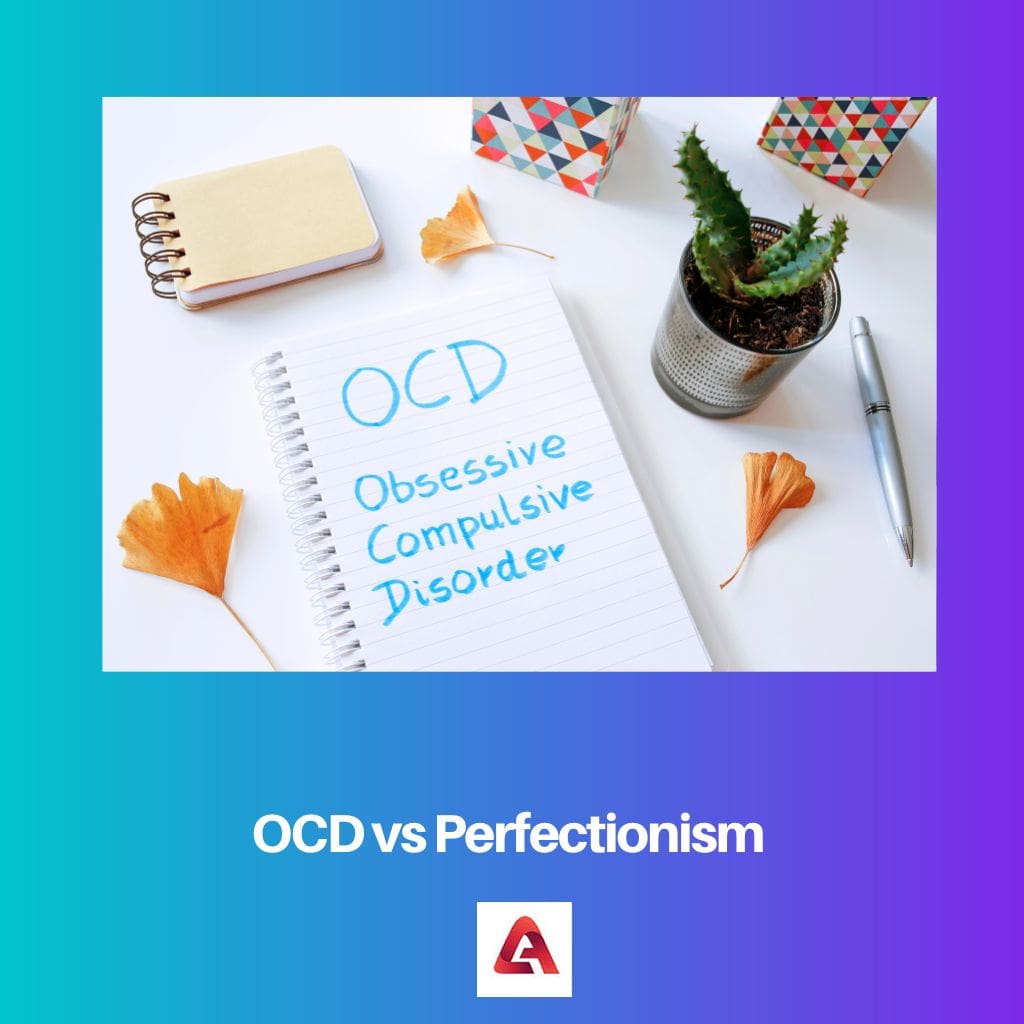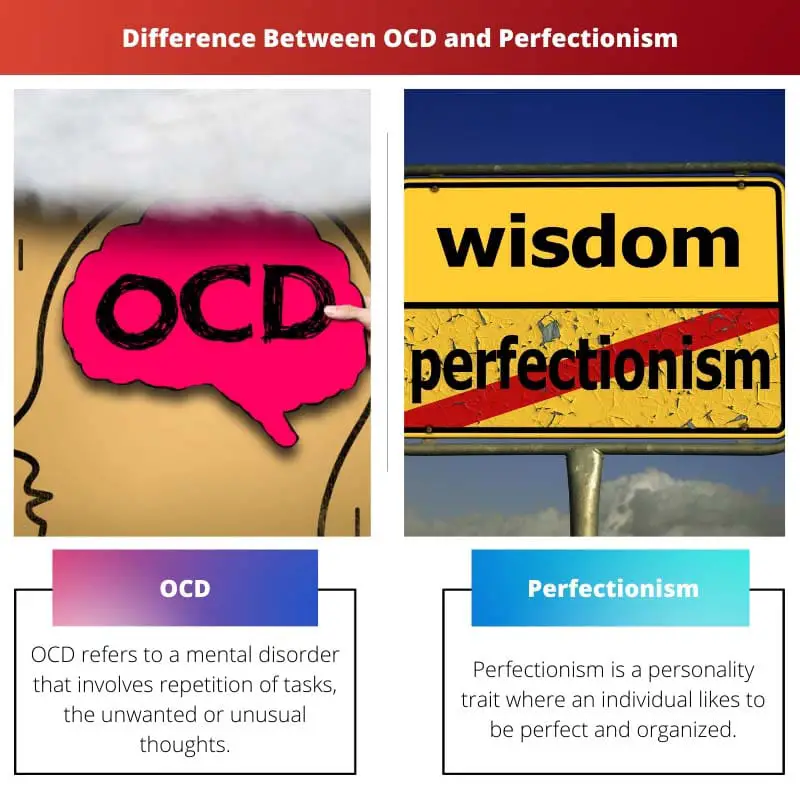The terms OCD and Perfectionism refer to being perfect in both situations, but there are slight differences between them.
OCD stands for Obsessive Compulsion Disorder. OCD refers to a medical condition that arises due to some kind of obsessions, compulsions, or both at the same time, which is time-consuming.
On the other hand, Perfectionism is a personality trait where one tries to be perfect in their respective work. It does not fall under the category of mental disorder.
Key Takeaways
- Obsessive-Compulsive Disorder (OCD) is a mental health condition characterized by intrusive thoughts and repetitive behaviors, while perfectionism involves setting excessively high standards for oneself.
- OCD interferes with daily life and causes significant distress, whereas perfectionism may not necessarily impair functioning.
- Treatment for OCD includes cognitive-behavioral therapy and medication, while addressing perfectionism may involve therapy focused on adjusting expectations and building self-compassion.

OCD vs Perfectionism
OCD is a mental health condition characterized by obsessions and compulsions aimed at relieving anxiety. It can cause significant distress and interfere with daily activities and relationships. Perfectionism is a personality trait characterized by a tendency to set high standards for oneself and others and to strive for flawlessness. People may feel a strong need to control their environment.
OCD refers to a mental disorder that involves the repetition of tasks and unwanted or unusual thoughts that makes room for anxiety or fear.
A person with this disorder clearly knows that he/she should not repeat things or think about unwanted thoughts, but they can not control themselves as it increases the level of anxiety.
On the other hand, Perfectionism is a personality trait where an individual likes to be perfect and organized. But, when this Perfectionism turns into being obsessed or compulsive or both at the same time, it is termed Perfectionism.
Perfectionism, to some extent, is beneficial, as it involves some effort to be perfect in their respective jobs.
Comparison Table
| Parameters of Comparison | OCD | Perfectionism |
|---|---|---|
| Definition | OCD (Obsessive Compulsive Disorder) refers to a mental disorder that involves repetition of tasks, the unwanted or unusual thoughts that makes room for anxiety and fear, if not repeated. | Perfectionism is a personality trait where an individual likes to be perfect and organized. |
| Types | Even though there is no official classification of OCD but, it mainly experiences four types of OCD — cleaning and contamination, symmetry and order, forbidden and harmful, and taboo thoughts and impulses. | Perfectionism is mainly of two types — adaptive/healthy perfectionism and maladaptive/unhealthy perfectionism. |
| Symptoms | Agitation, compulsive behavior, repetitive movement, meaningless repetition of words or actions, anxiety, social isolation, etc. | Feels like he fails at everything that he tries, procrastinates regularly, struggles to relax and share the thoughts and feelings, obsessed with rules, list, work, etc. |
| Actions and Behaviour | OCD involves involuntary and uncontrolled actions and behavior. | Perfectionism involves voluntary and optional actions and behavior. |
| Treatment | Usually need to be treated to overcome the worst of their compulsion. | Perfectionism may go overboard on occasion but, it does not interfere with their ability to function in daily lives. |
| Seriousness | OCD is a serious mental disorder. | Perfectionism is not serious as OCD. |
What is OCD?
OCD refers to a mental disorder that involves the repetition of tasks and unwanted or unusual thoughts that makes room for anxiety or fear.
A person with this disorder clearly knows that he/she should not repeat things or think about unwanted thoughts, but they can not control themselves as it increases the level of anxiety.
Officially there is no classification of OCD, but it mainly experiences four types of OCD, which are cleaning and contamination, symmetry, and ordering forbidden harmful and taboo thoughts and impulses.
OCD involves a lot of symptoms in a person, like agitation, compulsive behaviour, repetitive movement, meaningless repetition of words or actions, anxiety, fear, social isolation, etc.
A person with OCD involves repetitive tasks or unusual thoughts, when not done, the person feels irritation, anxiety, and fear.
OCD involves involuntary and uncontrolled actions and behaviour. A person can not control himself from repeating things as it leads to a great level of anxiety. Therefore, the person ends up repeating things.
Usually, OCD needs to be treated to overcome the worst of the compulsion. The person should be treated properly with proper medication or psychological treatment.
OCD is a serious mental disorder. Importance and proper treatment should be given in the initial stage to the person before turning it into a worse situation.

What is Perfectionism?
Perfectionism is a personality trait where an individual likes to be perfect and organized. But, when this Perfectionism turns into being obsessed or compulsive or both at the same time, it is termed Perfectionism.
Perfectionism, to some extent, is beneficial, as it involves some effort to be perfect in their respective jobs.
Perfectionism is mainly of two types — adaptive/healthy perfectionism and maladaptive/unhealthy perfectionism. In adaptive/healthy perfectionism, the person is associated with excellent psychological well-being and achievements in their jobs.
It involves goal-directed behaviour, good organization skills, high standards, etc. And on the other hand, maladaptive/unhealthy perfectionism is associated with low self-esteem, more mental illness, etc.
It involves doubting their work, having high expectations from others, excessive perfection, fears about involving themselves in a new mistake, etc.
For a person with Perfectionism, the symptoms are — the person feels like he fails at everything that he tries, procrastinates regularly, struggles to relax and share thoughts and feelings, and is obsessed with rules, lists, works, etc.
Perfectionism involves voluntary and optional actions and behaviour. The person is conscious and aware of his actions and behaviour.
Perfectionism may go overboard on occasion, but it does not interfere with their ability to function in their daily lives. Perfectionism is not that serious as compared to OCD.

Main Differences Between OCD and Perfectionism
- OCD (Obsessive Compulsive Disorder) refers to a mental disorder that involves the repetition of tasks, the unwanted or unusual thoughts that makes room for anxiety and fear if not repeated. On the other hand, Perfectionism is a personality trait where an individual likes to be perfect and organized.
- Even though there is no official classification of OCD, it mainly experiences four types of OCD — cleaning and contamination, symmetry and order, and forbidden harmful and taboo thoughts and impulses. On the other hand, Perfectionism is mainly of two types — adaptive/healthy perfectionism and maladaptive/unhealthy perfectionism.
- Some symptoms of OCD are — agitation, compulsive behaviour, repetitive movement, meaningless repetition of words or actions, anxiety, fear, social isolation, etc. On the other hand, a person with Perfectionism symptoms is — feels like he fails at everything that he tries, procrastinates regularly, struggles to relax and share thoughts and feelings, obsessed with rules, lists, works, etc.
- OCD involves involuntary and uncontrolled actions and behaviour. On the other hand, Perfectionism involves voluntary and optional actions and behaviour.
- Usually, OCD needs to be treated to overcome the worst of the compulsion. On the other hand, Perfectionism may go overboard on occasion, but it does not interfere with their ability to function in their daily lives.
- OCD is a serious mental disorder. On the other hand, Perfectionism is not as serious as compared to OCD.




